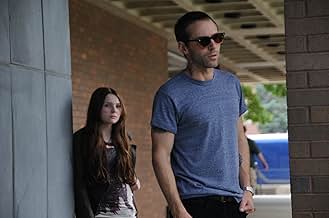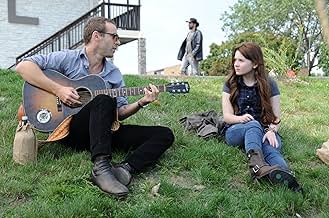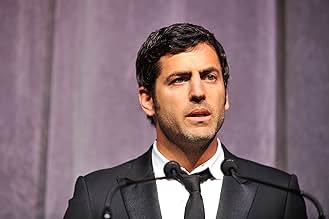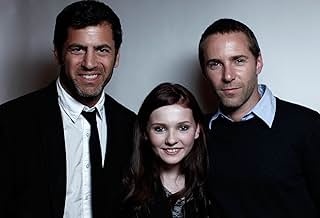PUNTUACIÓN EN IMDb
6,6/10
2,4 mil
TU PUNTUACIÓN
Una joven que abandonada por su ex madre groupie, le dice a una estrella de rock que poco a poco se desvanece, que ella es su hija.Una joven que abandonada por su ex madre groupie, le dice a una estrella de rock que poco a poco se desvanece, que ella es su hija.Una joven que abandonada por su ex madre groupie, le dice a una estrella de rock que poco a poco se desvanece, que ella es su hija.
- Premios
- 1 nominación en total
Joel David Moore
- Dave
- (as Joel Moore)
Katie Rich
- Brassy Girl
- (as Katie Riccio)
Argumento
¿Sabías que...?
- CuriosidadesThe film's dedication is "For Julia", who is director's David M. Rosenthal real daughter and his assistant director for this film. They first met when he was 30 and she was 11.
- Citas
Ethan Brand: [woken in his bunk] Where are we?
Chuck: We just arrived at douche-ville. This is your stop!
- ConexionesFeatured in Ebert Presents: At the Movies: Episodio #2.16 (2011)
- Banda sonoraBack From the Dead
Written by Conor O'Neill, Joseph Turner, Marc Philips, Alexander Gomez
Performed by Your Mom
Courtesy of Blanket Party Music (ASCAP), One Ill Music (ASCAP), Cram It in Music Music (ASCAP), Pound You Into the Ground Publishing (ASCAP)
Reseña destacada
"Janie Jones," directed by David M. Rosenthal in 2010, is a cinematic work that stands out for the depth of its plot and the meticulous development of its characters. The story introduces us to Janie Jones (played by Abigail Breslin), a teenager whose life takes a turn when she meets Ethan Brand (played by Alessandro Nivola), a musician in decline. The revelation that Janie is, in fact, Ethan's daughter is the starting point for a journey that encompasses much more than the simple acknowledgment of paternity. The film unfolds gradually, allowing viewers to witness the growth and transformation of the characters as they navigate challenges, adventures and emotional discoveries.
"Janie Jones" is a film that explores themes that resonate universally. One of the central themes is that of the family, and how it can be a source of support, reconciliation and love, regardless of the circumstances. Ethan's journey from reluctant father to devoted father is moving and inspiring, showing how people can change and grow when faced with parental responsibilities. The film also sheds light on the life of a teenager who faces a series of challenges, including a search for her own identity amidst the chaos. This is a film that makes us reflect on the complexities of family relationships and the importance of mutual love and support in building true bonds.
The journey and relationship between the protagonists, Janie and Ethan, is the emotional core of the story. They evolve in deep and complex ways, providing a richly developed narrative. At the start of the film, Janie is a confused and vulnerable teenager who appears backstage at a concert by Ethan, a fading musician. The revelation that Ethan is her father takes her by surprise, and she is met with indifference by him. Their relationship begins at a point of distrust and estrangement. Afterwards, the film enters a road journey phase, in which Janie and Ethan travel together in a van. This journey is crucial to the development of their relationship. During their time together, they share moments of genuine connection and discover aspects of each other that were previously hidden. Music plays a key role in this process. Ethan, a talented musician, plays songs for Janie on his guitar, and music becomes a common language that unites them. Janie also reveals a natural talent for music, demonstrating her own ability on the piano. As the journey continues, the bonds between Janie and Ethan grow stronger. They share personal stories, laugh together and support each other during difficult times. Ethan begins to take a more active role in Janie's life, not just as a father, but as someone who genuinely cares about her well-being. This transformation is especially evident in the scenes where Ethan protects her from harm and encourages her to express herself musically.
In the third act, their relationship faces significant challenges. There are moments of conflict and emotional confrontation, in which both express their frustrations and insecurities. These moments of tension are essential for the characters' growth, as they force them to face their own mistakes and limitations. However, these conflicts also reveal how much they care for each other. The film culminates in a moving scene of reconciliation and closure. Without giving away too many spoilers, this scene involves a musical performance by Ethan and a final connecting moment between him and Janie. This is the culmination of the characters' emotional journey, where they fully recognize and accept their place in each other's lives.
The film's highlight is the extraordinary performances by Abigail Breslin and Alessandro Nivola. Breslin, in particular, captivates us with her masterful portrayal of Janie Jones. She masterfully captures the complexity of a teenager who has faced many adversities in her life, demonstrating an impressive range of emotions. Her performance is moving and genuine, providing an undeniable depth to her character. For his part, Alessandro Nivola delivers an equally remarkable performance as Ethan Brand, revealing his character's journey of redemption and self-acceptance in a deeply engaging way. The chemistry between the two actors is palpable, creating an emotional connection that becomes the film's beating heart.
Some scenes set the tone and journey presented here well. The scene that establishes the film's central dynamic occurs when Janie Jones (played by Abigail Breslin) appears backstage at an Ethan Brand (played by Alessandro Nivola) concert. The revelation that Janie is Ethan's daughter is fraught with tension, and their meeting sets the tone for the development of the father-daughter relationship; after some run-ins between Ethan and his band, Janie and Ethan's road trip begins. As they travel together, they share moments of connection and discovery, often involving music. These scenes illustrate the evolution of their relationship, showing how they begin to understand each other and enjoy each other's company.
Ethan is a talented musician, and several scenes feature his musical performances. One of the most notable is when he plays Janie a song on his guitar. Music serves as an expression of their emotions and a form of communication between them, creating moving moments. There's an emotionally charged scene where Janie and Ethan confront their own weaknesses and past mistakes. This scene is an important turning point in the narrative, as both characters begin to confront their own limitations and seek redemption. The film's final scene is one of the most touching. Without giving away too many spoilers, it involves a musical performance by Ethan and a final connecting moment between him and Janie. It's a scene that encapsulates the characters' emotional arc and offers a sense of closure and hope. Each of these scenes plays a key role in building the emotional narrative of "Janie Jones." They not only advance the story, but also reveal the complexities of the characters and their journeys of self-discovery and growth.
David M. Rosenthal's direction is adept at capturing the characters' emotional journey. He uses music as a universal language that connects Janie and Ethan, creating a soundtrack that not only complements but amplifies the narrative. The choice to shoot in real locations adds an additional layer of authenticity to the story, making the audience feel immersed in the world of the characters. The film's often raw and stripped-down atmosphere helps convey a sense of realism and accentuates the characters' emotions, making the cinematic experience even more immersive.
The film reaches a conclusion that is, at its core, a celebration of reconciliation and building family bonds. Janie and Ethan, who start out as strangers, find a genuine connection and learn to support each other. This evolution is a testament to the power of love and family, even if it is unconventional. The film reminds us that family can be formed not only by blood, but also by love and a commitment to care for each other. Another key theme in the conclusion is personal growth and self-discovery. Both Janie and Ethan go through developmental journeys throughout the film. Janie discovers herself as a talented musician and finds a father figure in Ethan, who transforms himself from a self-destructive musician into a devoted father. This change of both characters emphasizes the idea that people have the ability to evolve and redeem themselves, regardless of their past mistakes.
The conclusion also brings a sense of acceptance and closure to the characters. They accept the challenges they've faced and the choices they've made, and this allows them to move forward with hope and determination. The film's final scene, which involves a musical performance by Ethan, serves as an emotional culmination that encapsulates the entire story arc and characters' journey. Ultimately, the conclusion to "Janie Jones" is a mixture of emotion and hope. She reminds us that despite life's difficulties, human connection and the ability to grow and change are powerful elements that can lead to healing and transformation. The film invites us to reflect on the complex nature of family relationships and the importance of accepting and loving those around us, regardless of circumstances. This impactful conclusion reinforces the film's core message about the redemptive power of love and music, making "Janie Jones" an emotionally rich and rewarding cinematic experience.
"Janie Jones" is a film that explores themes that resonate universally. One of the central themes is that of the family, and how it can be a source of support, reconciliation and love, regardless of the circumstances. Ethan's journey from reluctant father to devoted father is moving and inspiring, showing how people can change and grow when faced with parental responsibilities. The film also sheds light on the life of a teenager who faces a series of challenges, including a search for her own identity amidst the chaos. This is a film that makes us reflect on the complexities of family relationships and the importance of mutual love and support in building true bonds.
The journey and relationship between the protagonists, Janie and Ethan, is the emotional core of the story. They evolve in deep and complex ways, providing a richly developed narrative. At the start of the film, Janie is a confused and vulnerable teenager who appears backstage at a concert by Ethan, a fading musician. The revelation that Ethan is her father takes her by surprise, and she is met with indifference by him. Their relationship begins at a point of distrust and estrangement. Afterwards, the film enters a road journey phase, in which Janie and Ethan travel together in a van. This journey is crucial to the development of their relationship. During their time together, they share moments of genuine connection and discover aspects of each other that were previously hidden. Music plays a key role in this process. Ethan, a talented musician, plays songs for Janie on his guitar, and music becomes a common language that unites them. Janie also reveals a natural talent for music, demonstrating her own ability on the piano. As the journey continues, the bonds between Janie and Ethan grow stronger. They share personal stories, laugh together and support each other during difficult times. Ethan begins to take a more active role in Janie's life, not just as a father, but as someone who genuinely cares about her well-being. This transformation is especially evident in the scenes where Ethan protects her from harm and encourages her to express herself musically.
In the third act, their relationship faces significant challenges. There are moments of conflict and emotional confrontation, in which both express their frustrations and insecurities. These moments of tension are essential for the characters' growth, as they force them to face their own mistakes and limitations. However, these conflicts also reveal how much they care for each other. The film culminates in a moving scene of reconciliation and closure. Without giving away too many spoilers, this scene involves a musical performance by Ethan and a final connecting moment between him and Janie. This is the culmination of the characters' emotional journey, where they fully recognize and accept their place in each other's lives.
The film's highlight is the extraordinary performances by Abigail Breslin and Alessandro Nivola. Breslin, in particular, captivates us with her masterful portrayal of Janie Jones. She masterfully captures the complexity of a teenager who has faced many adversities in her life, demonstrating an impressive range of emotions. Her performance is moving and genuine, providing an undeniable depth to her character. For his part, Alessandro Nivola delivers an equally remarkable performance as Ethan Brand, revealing his character's journey of redemption and self-acceptance in a deeply engaging way. The chemistry between the two actors is palpable, creating an emotional connection that becomes the film's beating heart.
Some scenes set the tone and journey presented here well. The scene that establishes the film's central dynamic occurs when Janie Jones (played by Abigail Breslin) appears backstage at an Ethan Brand (played by Alessandro Nivola) concert. The revelation that Janie is Ethan's daughter is fraught with tension, and their meeting sets the tone for the development of the father-daughter relationship; after some run-ins between Ethan and his band, Janie and Ethan's road trip begins. As they travel together, they share moments of connection and discovery, often involving music. These scenes illustrate the evolution of their relationship, showing how they begin to understand each other and enjoy each other's company.
Ethan is a talented musician, and several scenes feature his musical performances. One of the most notable is when he plays Janie a song on his guitar. Music serves as an expression of their emotions and a form of communication between them, creating moving moments. There's an emotionally charged scene where Janie and Ethan confront their own weaknesses and past mistakes. This scene is an important turning point in the narrative, as both characters begin to confront their own limitations and seek redemption. The film's final scene is one of the most touching. Without giving away too many spoilers, it involves a musical performance by Ethan and a final connecting moment between him and Janie. It's a scene that encapsulates the characters' emotional arc and offers a sense of closure and hope. Each of these scenes plays a key role in building the emotional narrative of "Janie Jones." They not only advance the story, but also reveal the complexities of the characters and their journeys of self-discovery and growth.
David M. Rosenthal's direction is adept at capturing the characters' emotional journey. He uses music as a universal language that connects Janie and Ethan, creating a soundtrack that not only complements but amplifies the narrative. The choice to shoot in real locations adds an additional layer of authenticity to the story, making the audience feel immersed in the world of the characters. The film's often raw and stripped-down atmosphere helps convey a sense of realism and accentuates the characters' emotions, making the cinematic experience even more immersive.
The film reaches a conclusion that is, at its core, a celebration of reconciliation and building family bonds. Janie and Ethan, who start out as strangers, find a genuine connection and learn to support each other. This evolution is a testament to the power of love and family, even if it is unconventional. The film reminds us that family can be formed not only by blood, but also by love and a commitment to care for each other. Another key theme in the conclusion is personal growth and self-discovery. Both Janie and Ethan go through developmental journeys throughout the film. Janie discovers herself as a talented musician and finds a father figure in Ethan, who transforms himself from a self-destructive musician into a devoted father. This change of both characters emphasizes the idea that people have the ability to evolve and redeem themselves, regardless of their past mistakes.
The conclusion also brings a sense of acceptance and closure to the characters. They accept the challenges they've faced and the choices they've made, and this allows them to move forward with hope and determination. The film's final scene, which involves a musical performance by Ethan, serves as an emotional culmination that encapsulates the entire story arc and characters' journey. Ultimately, the conclusion to "Janie Jones" is a mixture of emotion and hope. She reminds us that despite life's difficulties, human connection and the ability to grow and change are powerful elements that can lead to healing and transformation. The film invites us to reflect on the complex nature of family relationships and the importance of accepting and loving those around us, regardless of circumstances. This impactful conclusion reinforces the film's core message about the redemptive power of love and music, making "Janie Jones" an emotionally rich and rewarding cinematic experience.
- fernandoschiavi
- 20 ago 2023
- Enlace permanente
Selecciones populares
Inicia sesión para calificar y añadir a tu lista para recibir recomendaciones personalizadas
- How long is Janie Jones?Con tecnología de Alexa
Detalles
- Fecha de lanzamiento
- País de origen
- Sitio oficial
- Idioma
- Títulos en diferentes países
- Джэни Джонс
- Localizaciones del rodaje
- Empresas productoras
- Ver más compañías en los créditos en IMDbPro
Taquilla
- Presupuesto
- 3.000.000 US$ (estimación)
- Recaudación en Estados Unidos y Canadá
- 6840 US$
- Recaudación en todo el mundo
- 6840 US$
- Duración1 hora 54 minutos
- Color
- Mezcla de sonido
- Relación de aspecto
- 2.35 : 1
Contribuir a esta página
Sugerir un cambio o añadir el contenido que falta

Principal laguna de datos
By what name was Janie Jones (2010) officially released in India in English?
Responde





































